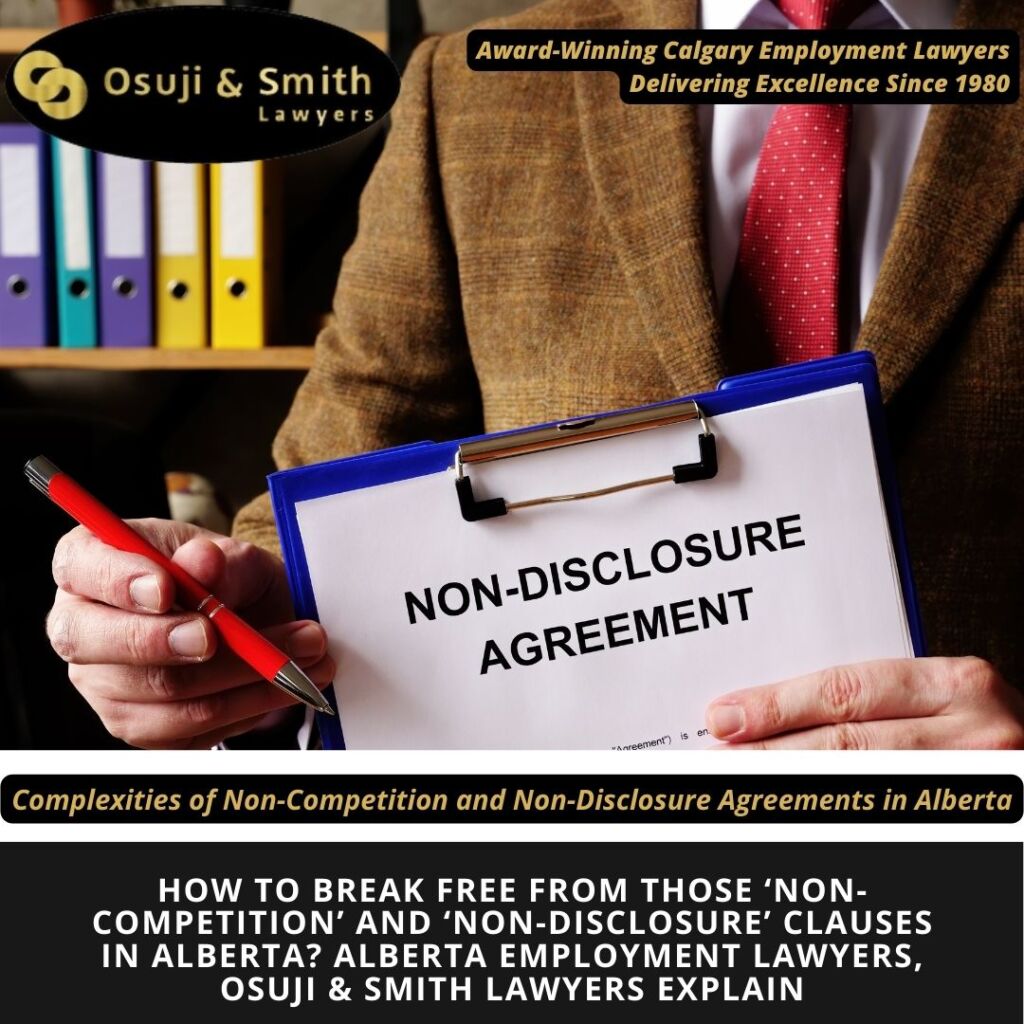How to Break Free from those ‘NON-COMPETITION’ AND ‘NON-DISCLOSURE’ CLAUSES IN ALBERTA? Alberta Employment Lawyers, Osuji & Smith Lawyers Explain
NON-COMPETITION AND NON-DISCLOSURE AGREEMENTS IN ALBERTA: Insights from Osuji & Smith Lawyers
In the landscape of employment law in Alberta, one area that continually pushes boundaries involves the rights and obligations stemming from ‘Non-Competition’ and ‘Non-Disclosure’ agreements (often referred to as ‘Non-Competes’ and ‘NDAs’). In Alberta, these contractual clauses are standard instruments designed to protect a company’s interests, proprietary information, and competitive edge. However, they can also significantly restrict an individual’s future employment prospects and freedom to operate in their professional capacity.
Given these constraints, many individuals seek ways to navigate through or around these restrictions effectively and legally. The experienced employment law team at Osuji & Smith Lawyers, a renowned law firm in Alberta specializing in employment law, offers a comprehensive insight into these complex issues. According to them, understanding the nuances and legal precedents associated with these agreements is key to assessing the potential avenues for relief.
Understanding Non-Competition and Non-Disclosure Agreements in Alberta:
- Non-Competition Clauses in Alberta: Non-competition clauses are contractual agreements that restrict an employee from working in a similar profession or trade in competition against their former employer. These restrictions typically cover a specified geographical area and time frame post-employment.
- Non-Disclosure Agreements: NDAs are contracts that prohibit an employee from sharing confidential or proprietary information learned during employment. These agreements are designed to protect sensitive data, trade secrets, client lists, strategies, and other forms of intellectual property.
Both types of contracts have valid places in protecting a business in Alberta; however, they can sometimes overreach and unduly limit an individual’s employment rights.
Challenges in Enforcement – The Legal Perspective in Alberta:
According to Osuji & Smith Lawyers, the enforceability of non-competition and non-disclosure agreements is not absolute in Alberta. Courts in Alberta tend to scrutinize these agreements closely, especially non-competes, as they can impinge on an individual’s right to earn a living.
The primary considerations, as outlined by Alberta courts, include:
- Reasonableness: The restrictions imposed must be reasonable regarding duration, geographic area, and scope of activity restricted. Overly broad or extensive limitations are often deemed unenforceable.
- Protection of Legitimate Business Interests: Employers must demonstrate that the restrictions are necessary to protect legitimate business interests (like trade secrets or customer lists) and not merely to stifle competition.
- Public Interest: The agreement must not be injurious to the public interest. For instance, eliminating competition in a way that affects market or consumer interests may not be upheld.

Strategies to Break Free From Non-Competition and Non-Disclosure Agreements in Alberta
Given the complexities involved, the legal experts at Osuji & Smith suggest several strategies that might be employed when seeking relief from these binding agreements:
- Legal Review and Consultation: The first step involves a thorough legal review of the contract. An employment lawyer can assess the terms to determine if there are grounds upon which the agreement may be unenforceable. This assessment can include examining the reasonableness of the terms and whether they are overly punitive or broad.
- Negotiation: Often, the concerns stemming from non-competes and NDAs can be resolved through direct negotiation. This process would involve the employee (and their legal counsel) discussing the contested points with the employer to reach a revised agreement that is satisfactory to both parties.
- Mediation or Arbitration: If negotiation fails, mediation or arbitration might be a viable alternative. These dispute-resolution mechanisms can help find a middle ground. The involvement of a third-party mediator or arbitrator can provide a fresh perspective and facilitate a resolution that respects both the individual’s rights and the employer’s business interests.
- Litigation: As a final resort, an individual can challenge the agreement in court. Litigation can be an expensive and time-consuming process, but it may be necessary if the contract imposes unfair restrictions. In such cases, the court has the discretion to invalidate the entire agreement or render certain overreaching clauses unenforceable.
Breaking free from the constraints of non-competition and non-disclosure agreements in Alberta can be a complex process that requires a nuanced understanding of contractual obligations and employment law. The skilled employment law legal team at Osuji & Smith Lawyers emphasizes that each situation must be evaluated on a case-by-case basis, considering the specific circumstances and legal merits.
Employees facing these challenges should seek professional legal advice. By pursuing the right legal strategy, individuals can ensure that their rights are protected, and a fair balance between employee freedom and legitimate business interests is maintained. Navigating this legal terrain with diligence and expert support is crucial in reaching a resolution that safeguards future professional endeavors.

